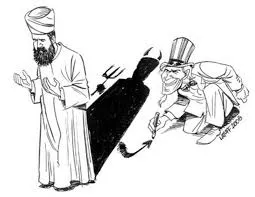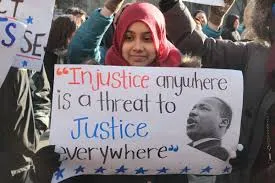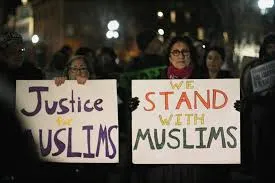The concept of Islamophobia has been diffused for several years, but its definition remains a subject of debate. Several institutions and actors participate in the process of speech production, in the scientific, political and media fields, reflecting the political and ideological issues that the use of this new notion raises. The objective of this reflection is to propose the "study of a word and its uses, through the different ideas or things that it has been able to express


When President Donald Trump first tried to stop citizens from seven predominantly Muslim countries from entering the United States, he cited the Sept. 11 terrorist attacks as his rationale. Yet none of the men behind those attacks hailed from these countries. In fact, a Cato Institute analysis shows that between 1975 and 2015 no one from these countries killed a single American in a U.S. terrorist attack.


Unfortunately, equating Muslims with terrorists has become disturbingly common in American society—and the consequences can be violent. According to a Federal Bureau of Investigation report released in November, the number of assaults, attacks on mosques and other hate crimes against Muslims in 2015 was higher than at any other time except the immediate aftermath of Sept. 11. In 2015, there were 257 anti-Muslim incidents, up from 154 in 2014—a 67 percent increase. In 2001, 481 incidents were reported.
Islamophobia's impact:
The hateful rhetoric toward Muslims gives people permission to be discriminatory toward them, whether overtly or more subtly
Muslim men get stereotyped as violent and criminal, research suggests. For Muslim women, the most common stereotype is that they lack control over their own lives. "The reality is that a lot of Muslim women view it as quite the opposite,
Muslims also face another form of discrimination—the assumption that they're not "real" Americans, "Nonwhite immigrant groups are viewed as perpetual foreigners and aliens in their own land, even though many have been in the country for several generations or view themselves as completely American,". The result of these negative messages is that many Muslims are in a constant state of vigilance.
Some may also be facing acculturative stress, "the behavioral, social and psychological change and stress that people experience when they encounter a different culture," explains Anisa N. Goforth, PhD, an assistant professor of psychology at the University of Montana. She and her colleagues have found that first- and second-generation Muslim ArabAmericans ages 11 to 18 who experienced acculturative stress were more likely to be withdrawn, sad and depressed, though holding on to their religious practices helped protect them against psychological problems.


Anti-Muslim discrimination doesn't just hurt Muslims. It may also undermine U.S. employers, suggests research by Saba Rasheed Ali, PhD, a professor of counseling psychology at the University of Iowa's College of Education. In a study of more than 125 Muslim women in workplaces across the country, Ali and co-authors found that both workplace discrimination and religiosity were related to lower levels of job satisfaction. Whether women wore a hijab or not made no difference when it came to discrimination (Journal of Employment Counseling, 2015). This workplace discrimination could have an effect on productivity, Ali speculates. "Any time someone experiences low job satisfaction, they're not as productive," she says. "When you give support to Muslim women—or any worker—you have an impact on their ability to do the job and do it well."

Taking action:
Recognizing the threat that Islamophobia poses, psychologists are working to make sure Muslim Americans get the help they need. Unfortunately, Muslim Americans face several barriers to treatment, including stigma about mental health and mental health services in Muslim communities, says Phoenix-area practitioner Nafisa Sekandari, PsyD. "Some imams have said that talk therapy is incompatible with Islam, that people should just pray more," says Sekandari.
In addition, the fear of anti-Islam sentiments can keep people from reaching out to non-Muslim psychologists, Sekandari says. "I've also had several patients who have gone to non-Muslim psychologists who told them that they needed to change their religion," she says. "We need to educate non-Muslim psychologists. If you have a bias toward Islam or any religion, you need to refer people to other providers."
To counter the stigma, Sekandari, along with teacher and activist Hosai Mojaddidi, co-founded www.MentalHealth4Muslims.com
in 2009. The site offers a directory of Muslim mental health practitioners around the country, as well as articles, podcasts, webinars and other resources for people seeking help.
While such interventions hold promise at the individual level, psychologists say the problem needs to be addressed on a more systemic level as well. One psychologist who is taking that kind of action is Sameera Ahmed, PhD, who directs the Family and Youth Institute in Canton, Michigan, a research and education institute specializing in the mental health needs of American Muslims.

